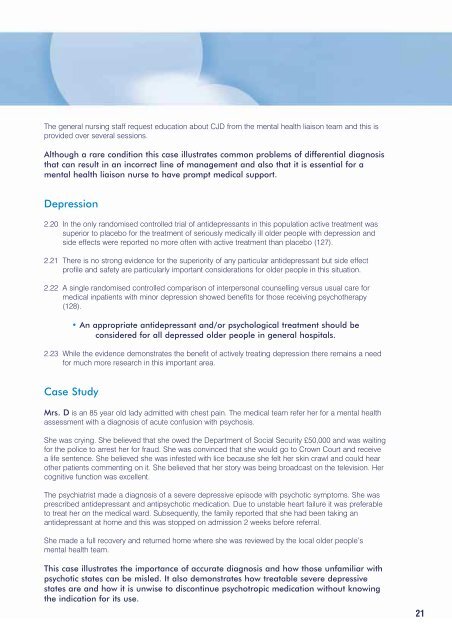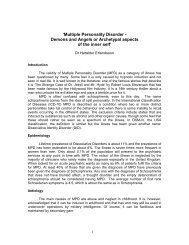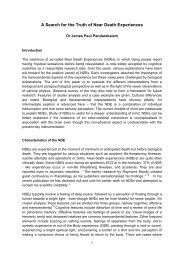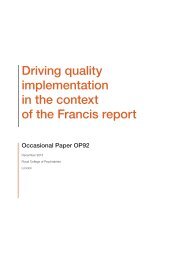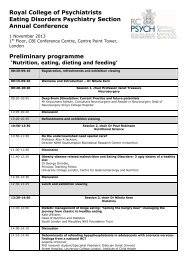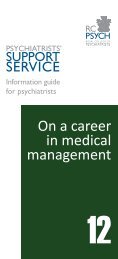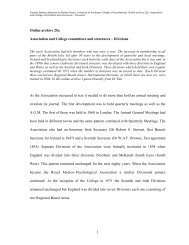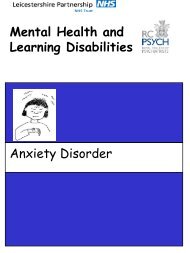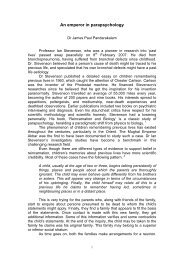Who Cares Wins - Royal College of Psychiatrists
Who Cares Wins - Royal College of Psychiatrists
Who Cares Wins - Royal College of Psychiatrists
You also want an ePaper? Increase the reach of your titles
YUMPU automatically turns print PDFs into web optimized ePapers that Google loves.
The general nursing staff request education about CJD from the mental health liaison team and this is<br />
provided over several sessions.<br />
Although a rare condition this case illustrates common problems <strong>of</strong> differential diagnosis<br />
that can result in an incorrect line <strong>of</strong> management and also that it is essential for a<br />
mental health liaison nurse to have prompt medical support.<br />
Depression<br />
2.20 In the only randomised controlled trial <strong>of</strong> antidepressants in this population active treatment was<br />
superior to placebo for the treatment <strong>of</strong> seriously medically ill older people with depression and<br />
side effects were reported no more <strong>of</strong>ten with active treatment than placebo (127).<br />
2.21 There is no strong evidence for the superiority <strong>of</strong> any particular antidepressant but side effect<br />
pr<strong>of</strong>ile and safety are particularly important considerations for older people in this situation.<br />
2.22 A single randomised controlled comparison <strong>of</strong> interpersonal counselling versus usual care for<br />
medical inpatients with minor depression showed benefits for those receiving psychotherapy<br />
(128).<br />
• An appropriate antidepressant and/or psychological treatment should be<br />
considered for all depressed older people in general hospitals.<br />
2.23 While the evidence demonstrates the benefit <strong>of</strong> actively treating depression there remains a need<br />
for much more research in this important area.<br />
Case Study<br />
Mrs. D is an 85 year old lady admitted with chest pain. The medical team refer her for a mental health<br />
assessment with a diagnosis <strong>of</strong> acute confusion with psychosis.<br />
She was crying. She believed that she owed the Department <strong>of</strong> Social Security £50,000 and was waiting<br />
for the police to arrest her for fraud. She was convinced that she would go to Crown Court and receive<br />
a life sentence. She believed she was infested with lice because she felt her skin crawl and could hear<br />
other patients commenting on it. She believed that her story was being broadcast on the television. Her<br />
cognitive function was excellent.<br />
The psychiatrist made a diagnosis <strong>of</strong> a severe depressive episode with psychotic symptoms. She was<br />
prescribed antidepressant and antipsychotic medication. Due to unstable heart failure it was preferable<br />
to treat her on the medical ward. Subsequently, the family reported that she had been taking an<br />
antidepressant at home and this was stopped on admission 2 weeks before referral.<br />
She made a full recovery and returned home where she was reviewed by the local older people’s<br />
mental health team.<br />
This case illustrates the importance <strong>of</strong> accurate diagnosis and how those unfamiliar with<br />
psychotic states can be misled. It also demonstrates how treatable severe depressive<br />
states are and how it is unwise to discontinue psychotropic medication without knowing<br />
the indication for its use.<br />
21


